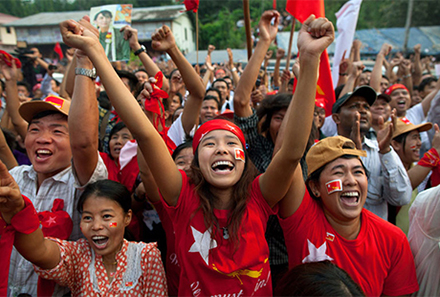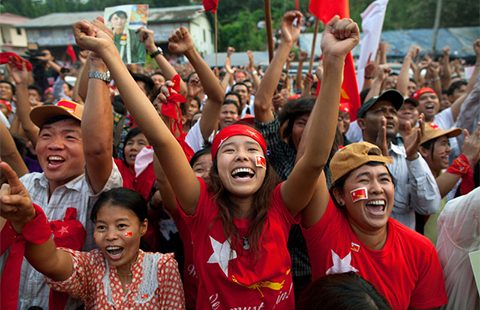
National League for Democracy (NLD) supporters celebrate their victory in parliamentary elections outside party headquarters on 1 April, 2012 in Yangon, Myanmar. Photo by Paula Bronstein/Getty Images.
The success of Myanmar’s historic elections this November will depend on whether they are able to create a sense of legitimacy and acceptable outcomes in light of major reform.
Last week Myanmar announced that it will hold historic free elections on Sunday 8 November.
It will be the first open general election in 25 years and will also be contested by opposition leader Aung San Suu Kyi’s National League for Democracy. The elections represent a crucial step forward in the country’s transition to civilian rule and democracy, after decades of military rule ended in 2010.
Myanmar’s political transition is an unusual phenomenon: it is self-made, without any external agency supervising, monitoring or enforcing it. It also derives its power, and authority from the popular support it generates, with or without elections to legitimise it, because of the wider political support it enjoys for the moment.
Any “incentives” for those in real control to continue the transition are contained within the process, either in terms of positive options that become available (such as substantial new trade or investment or funding), or in terms of negative options that disappear (lifting of political sanctions, economic sanctions, and inclusion in regional development arrangements, rather than exclusion).
The other main characteristic of Myanmar’s transition is that it is tolerated and in principle supported by those giving up power – the military – who can allow it to continue, or who can block it, partially or totally. In all of this, external influences play an important part, but are not critical; they can be supportive, collaborative and expect considerable benefits for their own interests, but they should anticipate a perhaps less than perfect “Myanmar” solution, and cannot count on imposing their own wishes or creating “mirror” copies of their own socio-economic paradigms. In Myanmar, new institutions are being established but are not necessarily yet fully tested; and old institutions are being (slowly) transformed, but are often still incapable of producing the hoped for results.
In such circumstances, it can hardly be surprising that many of Myanmar’s “reforms” since 2011 are incomplete, are not delivering all the outcomes hoped for, or in many instances, have not yet even begun to be carried out in any concrete way. Some changes can be implemented by announcement alone, and might rely on general goodwill or on willingness to give things “a go” to see whether or not they can work reasonably well.
Examples of this are some of the post-2011 macro-economic reforms, which were not contested by anyone, and which were welcomed internationally. Other change, however, will depend on institutional reforms that can be much more difficult to achieve without resort to authoritarian methods or that can take much longer where deeply entrenched “mindsets” have to be modified, gradually and by consent.
Myanmar is facing all these alternatives: it already enjoys substantial freedom of the press, freedom of association, and freedom of assembly, but little progress had been made so far in achieving rule of law. It has created a “multi-party” democratic super-structure, but for the time being allows the military to retain its veto, and to remain above the law in many (but not all) respects.
The worst thing that the world can do in respect of Myanmar’s reforms is to revert to hasty criticism when reforms are less than perfect, or to set unrealistically high expectations of the reforms in terms of their content, their timing, and their compliance with international norms (which may not be the most important measure of their implementation). Equally unhelpful, is for the international community to withhold financial or technical support for reforms, especially if the reforms have some measure of international normative backing.
Some aspects of Myanmar’s transition are proving somewhat unpredictable and erratic, as pluralistic decision-making occurs, and some decisions are reversed or modified. Naturally, not all these changes are for the better, but they are for the most part the genuine product of Myanmar’s complicated and often unproven decision-making. The people of Myanmar, and the rest of the world, might have to live with them, until good sense prevails and revised policies can be developed.
But like anywhere, some people will be reluctant to admit they were wrong, or to allow that changes that suit them may not necessarily be to everyone’s liking. This happens everywhere. Systemic or policy “repairs” will be necessary from time-to-time, and will often be very welcome. It remains to be seen how much of this in the end represents “democracy” as it is generally known; Myanmar’s leaders are speaking less and less about democracy as their transition evolves, but ultimately the final shape of their transition is their “call”.
Public interest both inside and outside Myanmar is increasingly focused on the next general elections, to be held on Sunday 8 November. Myanmar will never be as well prepared for a general election, but with a voter enrolment of around 30 million, and voting across the country and overseas, it is a very substantial undertaking. Not only has Myanmar been the beneficiary of international “best practice” election expertise before the elections, but the quasi-independent Union Election Commission seems to have been making more intensive preparations for these elections, and in the process engaging in its most extensive consultations ever with the electorate.
Party registration and voter registration has been carried out more thoroughly than in previous elections, including 2010. Election management staff, party officials, and independent civil society representatives have been better trained in their roles. Much greater domestic and international observation of the voting process will ensure better transparency. All of these factors will contribute to an improved election process.
In the end, the success of the 2015 elections will be judged by the legitimacy they engender, which depends on the general acceptability of the outcomes. Politically, the elections would enjoy greater legitimacy if they were not held under the unchanged 2008 constitution, which was not really the product of a democratic process.
The 2008 constitution would be improved if a compromise could be reached on some of the amendments that have been discussed in the past two years. In recent weeks, military representatives in the parliament have voted against constitutional amendments that would have reduced the vote required for constitutional change, and to allow Aung San Suu Kyi to be a candidate for the presidency, both of which were supported by her party the National League for Democracy, raising expectations of change.
However, serious debate on constitutional amendments has not occurred as fully as it should have, and in the end insufficient time was allowed for agreement to be achieved within the present parliament. In all likelihood, the election outcomes will be confused, and it may be some time before new policies are determined, even if the election process itself is peaceful and fair. Prolonged uncertainty after the elections will not be in anyone’s interests, but may be unavoidable to some extent.
One would hope that the overall reform trajectory towards democracy will continue after 2015 whoever holds the reins of power. Many domestic and international parties should find it in their interests to press strongly for the continuation of previous policy directions and completion of the tasks that in many cases have only begun.
International groups with which Myanmar has been most closely engaged in recent years – such as ASEAN, UN specialised agencies, international financial institutions, international NGOs – may well see unmistakable opportunities to support and further encourage reform. Hopefully, Myanmar’s post-2015 leaders will remain open to reasonable offers of continuing backing for important nation building tasks and much-needed assistance for the Myanmar people at large. It behoves all Myanmar’s friends and neighbours to stand ready to help with Myanmar’s post-2015 challenges, which will remain considerable.
Most important of all is achieving effective rule of law in every sense of the phrase. Until significant progress is achieved in embedding rule of law into all aspects of society, sound socio-economic policies will be hard to accomplish, and it will be impossible to protect individual rights and freedoms. Yet these are the very goals that Myanmar now needs as a state, and that its people now aspire to more than ever.
The other main post-election priority task will be to consolidate the nationwide peace negotiations. These were meant to have been completed before the elections, but not unexpectedly have encountered delays. Not only are there still insurgencies on a few fronts, but the question of communal violence remains unresolved.
While these are not easy tasks by any means, Myanmar’s leaders must show greater determination to bring these matters to a satisfactory outcome without undue delay. Otherwise, these ongoing conflicts will cast a deep shadow over any efforts to make progress economically, socially, and politically. Without real progress on this front, the wider legitimacy of any election outcome will suffer.
Trevor Wilson is a former Australian ambassador to Myanmar and a visiting fellow in the Coral Bell School of Asia Pacific Affairs at The Australian National University.
A version of this article will appear in the August edition of The Diplomatist magazine.
 Facebook
Facebook  Twitter
Twitter  Soundcloud
Soundcloud  Youtube
Youtube  Rss
Rss 